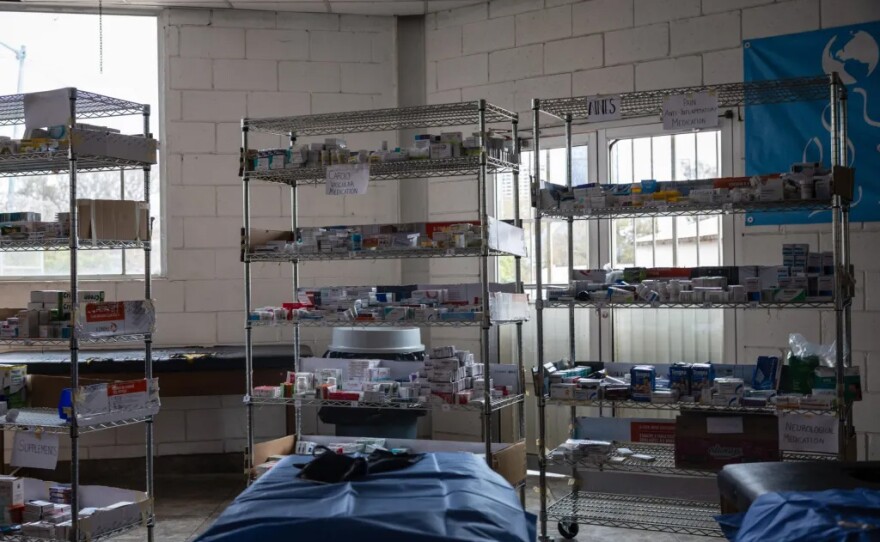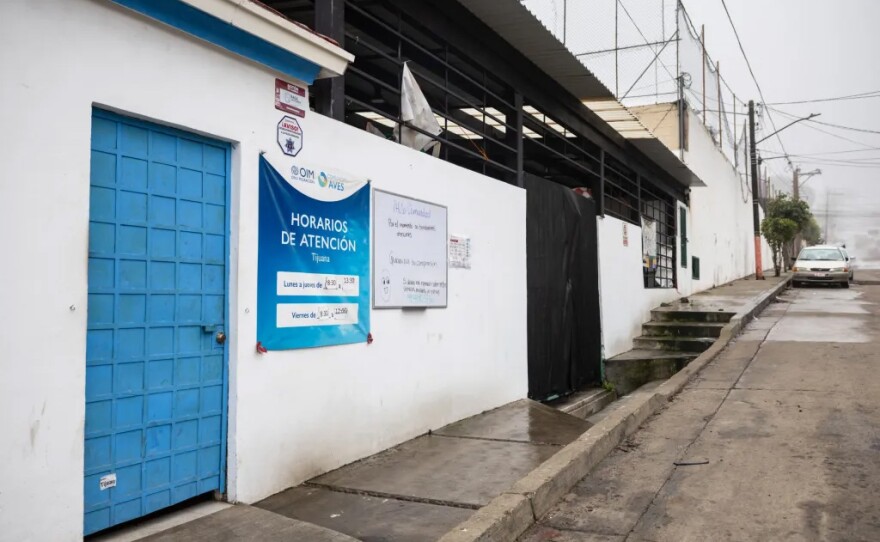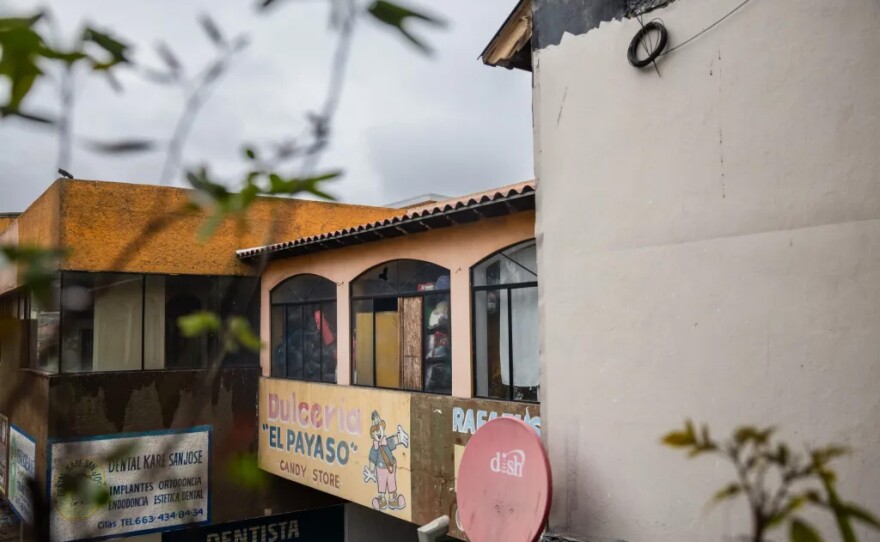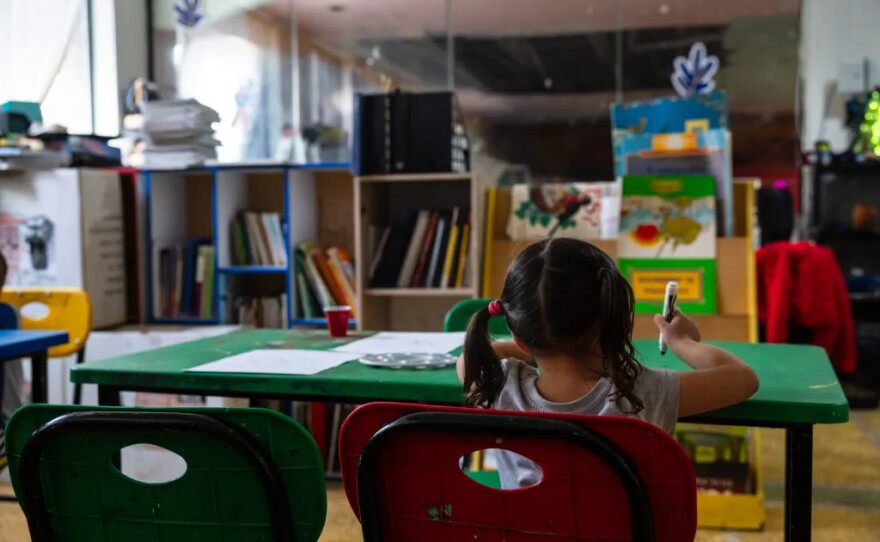In the wake of President Donald Trump’s executive order halting billions of dollars in foreign aid, agencies in Tijuana are suspending programs for medical and psychological care, food assistance and other services that helped thousands of migrants and low-income residents.
On Friday, a community health and social services clinic called Comunidad AVES shuttered its doors indefinitely in response to the order, shelter leaders told inewsource. A handwritten note on a whiteboard outside read in Spanish: We will not be providing services for the moment.
They’re bracing for other impacts, too: Food vouchers for a church sheltering more than a thousand migrants were canceled. A childcare program for kids and teens ended. And a planned infrastructure improvement project at another shelter for women and children was put on pause.
Trump’s Jan. 20 order froze U.S. aid payments for 90 days pending the administration’s review of program efficiencies and alignment with Trump’s “America First” foreign policy. In the order, Trump said foreign aid is “not aligned with American interests and in many cases antithetical to American values.”
The U.S. government spends just a small fraction of its budget on international aid – about $72 billion in 2023, or 1% of total U.S. spending that year. Promoted as a tool to advance U.S. foreign policy around the world, foreign aid programs have also drawn criticism and questioning over the value of the spending for U.S. taxpayers.
The effects of the pause have been felt around the world and just across the U.S.-Mexico border.

“We are left alone,” said Claudia Portela, who runs two migrant shelters and a soup kitchen under Proyecto Salesiano, a Catholic missionary congregation that has been in Tijuana for nearly 40 years.
Proyecto Salesiano serves well over a thousand asylum-seekers, deportees and homeless people daily. Portela said more than half of their services are affected by the funding freeze. It’s unclear when the services could restart.
“People will keep coming. Those sheltered here will still be here. They need to be taken care of, so it’s very difficult,” Portela said.
Most of the more than 30 shelters in Tijuana are privately run and rely on grants and individual donations, which means funding basic necessities is a constant challenge. American aid helped provide services that shelters could not provide on their own.
Comunidad AVES, a collaboration between Salesiano and the International Organization for Migration, offered basic health care, therapy, job training, legal assistance and other services to thousands of migrants and low-income Tijuana residents since 2023.

About a week after Trump’s order, Secretary of State Marco Rubio announced exceptions to the freeze for “lifesaving humanitarian assistance,” but it’s unclear whether those waivers include services in Tijuana.
In 2023, the U.S. gave more than $240 million in aid to Mexico, administered through partner organizations including the International Organization for Migration and and the United Nations Children’s Fund, or UNICEF.
About 12% of that funding – just under $30 million – went toward humanitarian aid in Mexico. Most funded economic development, security and governance projects, including to improve the justice system, end human trafficking and child labor, reduce corruption and promote job opportunities.


A spokesperson for the International Organization for Migration in Mexico declined to comment on the situation in Tijuana. A UNICEF spokesperson did not return requests for comment.
The United Nations Refugee Agency, which also works in Tijuana, said they “understand some exceptions will be made, but have no specific information.”
The administration is also attempting to slash the U.S. Agency for International Development, or USAID, one of the federal agencies through which American aid is distributed. A federal judge on Friday blocked plans to put thousands of USAID workers on leave.
At a shelter for women and children near the border, projects to repair the ceiling and floors were canceled following the freeze on aid, according to Judith Cabrera, who co-directs the Border Line Crisis Center.

On a recent rainy afternoon, broken windows allowed a draft into the room, puddles pooled inside near an entrance and bits of drywall crumbled from the ceiling. Inside, kids took turns riding a scooter, while others ate pancakes and drew pictures with markers.
Cabrera said they are used to working with very little help from the government – both from the U.S. and Mexico – but the impact of Trump’s immediate and drastic policy changes on immigration and border has taken a toll.
“It’s hard to see so many things pile up. The emotional psychological impact has been a lot,” Cabrera said.

The attacks on foreign aid come at a time when migrant shelters in Tijuana and other Mexican border cities could see increased need after Trump blocked asylum access at the southern border and aims to remove millions of people from the U.S.
On his first day in office, Trump ended a Biden-era program known as CBP One, leaving thousands of migrants waiting in Mexico for months without a clear path to protection in the U.S.
The program previously allowed immigrants to enter the country through a lottery-based appointment system.
On Inauguration Day, when all future appointments were suddenly canceled, some migrants said they would keep waiting, but others have suggested returning to their communities or countries of origin.
Trump’s promises of mass deportations – if realized – could further swell shelters and strain resources in Mexican border cities, which anticipate the arrival of thousands of U.S. deportees in coming months.
And with less American aid to feed and shelter them, migrants could be recruited into organized crime or could themselves become victims of extortion, kidnapping or violence, according to Adam Isacson, a program director at the Washington Office of Latin America, a research and advocacy group.
“People are going to be really vulnerable to that. And just for their own safety, many of them may try to go back to the United States,” Isacson said.







